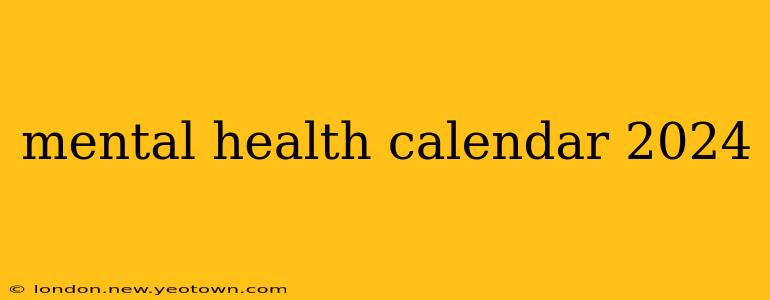The year is 2024. A fresh start, a new calendar, and a renewed opportunity to prioritize your mental wellbeing. This isn't just about scheduling appointments; it's about weaving self-care into the fabric of your daily life. This mental health calendar isn't a rigid structure, but a flexible guide to help you navigate the year with intention and mindfulness.
Imagine this: You're not just passively reacting to life's ups and downs; you're actively shaping your mental landscape, creating a year where you flourish. That's the power of a mindful approach to mental health.
This isn't a replacement for professional help – if you're struggling, please reach out to a therapist or counselor. But this calendar can be a powerful complement to your existing self-care routine, or a gentle nudge to begin one.
How to Use This Mental Health Calendar
This isn't a pre-filled calendar with specific dates. Instead, think of it as a toolbox of ideas and prompts to help you personalize your year of self-care. You can use it to:
- Plan regular self-care activities: Schedule in time for exercise, meditation, journaling, or spending time in nature.
- Track your mood: Use a simple system to monitor your emotional well-being throughout the year.
- Set mental health goals: Identify areas where you want to improve and create actionable steps to achieve those goals.
- Celebrate your successes: Acknowledge and appreciate your efforts in prioritizing your mental health.
- Plan breaks and downtime: Schedule regular periods of rest and relaxation to avoid burnout.
Monthly Themes and Activities
Each month can have a different focus. Consider these themes to inspire your planning:
January: Setting Intentions. Begin the year by reflecting on the past and setting clear goals for your mental health in 2024. What self-care practices will you prioritize?
February: Self-Compassion. Practice kindness and understanding towards yourself. Challenge negative self-talk and embrace your imperfections.
March: Mindfulness and Presence. Focus on being present in the moment. Try mindfulness meditation, yoga, or simply paying attention to your senses.
April: Connecting with Others. Nurture your relationships with loved ones. Spend quality time with friends and family.
May: Exploring Nature. Spend time outdoors, go for walks in nature, or engage in outdoor activities that you enjoy.
June: Gratitude Practice. Focus on all the positive aspects of your life and express gratitude for them.
July: Setting Boundaries. Learn to say no to things that drain your energy and prioritize your own needs.
August: Creative Expression. Engage in activities that allow you to express yourself creatively, such as painting, writing, music, or dance.
September: Physical Health Focus. Recognize the link between physical and mental health. Prioritize exercise, healthy eating, and enough sleep.
October: Stress Management. Develop healthy coping mechanisms for dealing with stress and anxiety.
November: Reflection and Gratitude. Take time to reflect on the year and appreciate all that you’ve accomplished.
December: Rest and Recharge. Prioritize rest and relaxation to prepare for the new year ahead.
Frequently Asked Questions
What if I don't have time for self-care?
Even a few minutes a day can make a difference. Start small and gradually increase the time you dedicate to self-care as you find what works for you. Small acts of self-care throughout the day can be far more effective than one large act done once a week.
How can I track my mood effectively?
A simple mood tracker app or a journal can be helpful. You can rate your mood on a scale of 1-10 or use descriptive words to capture your emotional state.
What are some examples of self-care activities?
This is highly personal! It could be anything from taking a relaxing bath to going for a walk in nature, reading a book, listening to music, spending time with loved ones, or engaging in a hobby.
What if I'm struggling to stick to a routine?
Be patient and kind to yourself. It's okay to miss days or to adjust your routine as needed. The key is consistency, not perfection.
Where can I find resources for mental health support?
Your primary care physician is a great starting point. You can also search online for mental health resources in your area, or contact a crisis hotline if you are experiencing a mental health emergency.
Remember, this is your mental health calendar. Customize it to fit your needs and preferences. Make it a vibrant reflection of your commitment to your well-being in 2024.

